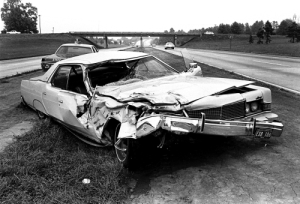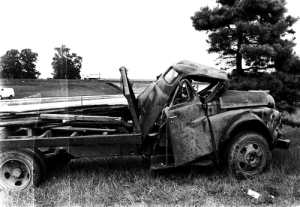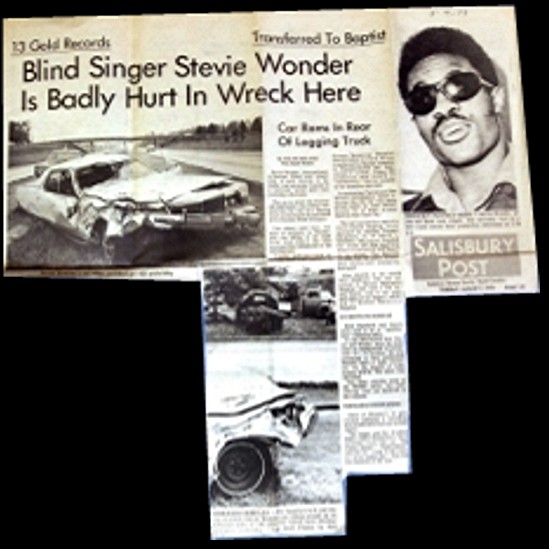
1973 Car Accident
You are the Sunshine of My Life was just descending the charts after reaching number one whilst Stevie’s new single
Higher Ground which spoke about spiritual progression through reincarnation, was
just beginning it’s upward climb. His recently released album, Innervisions, three
days earlier, was receiving rave reviews.
It was 6th August 1973 and the prodigious 23 year old singer, songwriter, musician and producer was
heading north on Interstate 85 on a hot dry Monday afternoon after a performance
the night before in Greenville, South Carolina.
In a wide 1973 Mercury Cruiser, a
rental car from Hertz, driven by his cousin John Wesley Harris, Stevie was on
his way to a benefit performance for the radio station WAFR in Durham sitting in
the front passenger seat. Behind them were two other cars from Stevie’s
entourage. Stevie had with him a reel-to-reel tape recorder along with two-track
mixes of "Innervisions" which he wanted to listen to. Needing a connection to
power the player from the car, Harris stopped off briefly at an electronics
store near Charlotte to purchase a suitable cable.
 As
they approached the town of Salisbury at around 1:40 p.m., just ahead of them
was 23 year old Charlie Shepherd in his 1948 Dodge flatbed farm truck. A sleeping Wonder was wearing headphones, and Harris,
distracted by something, failed to notice the flatbed truck ahead of them.
As
they approached the town of Salisbury at around 1:40 p.m., just ahead of them
was 23 year old Charlie Shepherd in his 1948 Dodge flatbed farm truck. A sleeping Wonder was wearing headphones, and Harris,
distracted by something, failed to notice the flatbed truck ahead of them.
There have since been conflicting
accounts of the series of events that led to the injury of Stevie. One of the
more popular reports that still pervade books and the internet was that a log
came flying off the truck, crashed through the windshield of Wonder’s car and
hit him on the head, sending him into a coma.
However Shepherd in a statement
later had said he had already delivered his load of logs in China Grove and that
the back of his truck was empty as he headed for home on Interstate 85.
Newspaper photographs taken on the scene don't show any large logs on the back
of the truck, just some small pieces and broken boards. That seems to mesh with
what Stevie told attorneys as part of a civil suit filed in connection with the
accident in 1976. He said the bed of the truck crashed through the windshield
and hit him in the forehead with "great force."
The 2002 biography "Blind Faith:
the Miraculous Journey of Lula Hardaway”, Stevie Wonder's Mother retold the
story as follows: "There was a great, grinding screech as metal hit metal and,
then, impossibly, as if in some lavishly produced Hollywood action movie, one of
the great logs disencumbered itself of the truck and came crashing through the
windshield, spearing Stevie square in the forehead."
 Piecing
together the disparate versions of the incident it is clear that Stevie’s car
did crash into the back of the flatbed truck, and the bed of the truck shattered
the windshield and struck him a glancing blow to the head as he would have moved
forward as a result of the impact.
Piecing
together the disparate versions of the incident it is clear that Stevie’s car
did crash into the back of the flatbed truck, and the bed of the truck shattered
the windshield and struck him a glancing blow to the head as he would have moved
forward as a result of the impact.
As a result of the collision,
Shepherd felt the jolt behind him and realized, that his truck was sliding out
of control toward the college on his right. The car skidded toward the median.
Shepherd's truck began tipping, then went into a full roll as its momentum
carried it completely over and it landed back on its wheels in the grass just
south of the overpass.
Shepherd’s both ankles were broken
and his upper lip badly cut. Stevie was unconscious, however his cousin, John
suffered cuts to his thigh and had glass lodged in his fingertips from the
shattered windshield.
Soon members of the band, traveling
in the two cars behind, arrived at the scene and stopped in a panic. One of his
brothers rushed to the car, which had come to rest in the median, and noticed
immediately that Stevie was unresponsive and bleeding from his forehead and
scalp.
Stevie was transferred to one of
the other cars. Asking directions to the nearest hospital - Rowan Memorial
Hospital, they headed off with the unresponsive singer.
C&M Ambulance Service, the private
ambulance company that served Rowan County, arrived later to transport Shepherd
and Harris.
Charlie Shepherd, flat on his back
in the emergency room, noticed Wonder waiting close to him. But he had no idea
who Stevie Wonder was; he had never heard of the pop star. The two men, both 23
from very different backgrounds, met by some chance of destiny on that faithful
day.
Word spread quickly that Stevie
Wonder had been injured badly in the I-85 accident. People from across the world
— reporters from ABC, NBC, CBS and the BBC, fellow entertainers and fans — were
calling the hospital, digging for any kind of information on Steve's condition.
Rowan Memorial doctors already were making plans to move Stevie to N.C. Baptist
Hospital because, it would be said later, the Winston-Salem hospital had
"neurological facilities."
A representative for The Jackson 5
also had called the hospital and offered the group's private
plane to fly Wonder anywhere in the country.
That same night, about 9:05, Wonder
arrived at N.C. Baptist Hospital's intensive care unit in Winston-Salem — his
vital signs were stable but he was still unconscious.
Stevie's mother, Lula Mae Hardaway,
heard a news bulletin about the wreck at her home in Detroit and quickly made
travel arrangements for Winston-Salem along with some of her other sons.
The Jackson 5, performing in
Greensboro, visited Wonder the day after the wreck. By telegram and telephone,
other entertainers such as former Beatle Paul McCartney, Roberta Flack and
members of the popular band Chicago sent hopes for a speedy recovery.
Meanwhile, word of Wonder's
condition at N.C. Baptist eked out morsel by morsel. On the Tuesday, doctors
upgraded Wonder's condition to satisfactory, but he remained in the intensive
care unit with what they described as "a bruise on the brain."
A hospital spokesman said no
surgery was "indicated or contemplated" and that no significant change in the
singer's condition was expected over the next 48 hours. A doctor also told the
newspaper that Wonder's chances for a complete recovery were good.
Wonder's longtime friend and
publicist Ira Tucker couldn't even recognize the star. To Tucker, the singer's
head seemed to be swollen five times its normal size — "and nobody could get
through to him."
A 2002 biography on Lula Hardaway,
"Blind Faith," also mentioned how Wonder's family and friends were trying to
reach Wonder with their words. The book recalls: "First one visitor and then
another would gingerly take his hand, lean over to his one exposed ear and
gently say, “Stevie, you there?"
The process of regaining full
consciousness was taking awhile. But the turning point in his hospital recovery
as an oft-repeated story goes — when Ira Tucker loudly began singing "Higher
Ground" to the comatose singer. “Gonna keep on tryin' til I reach my highest
ground.” Tucker soon noticed Wonder moving his fingers in time to the song —
doing keyboard licks on the hospital bed.
 Three
days into his hospital stay Stevie was able to talk enough to answer simple
questions and was making slow, steady progress." The next day he was being fed
liquids by mouth, instead of intravenously, though he remained in intensive
care.
Three
days into his hospital stay Stevie was able to talk enough to answer simple
questions and was making slow, steady progress." The next day he was being fed
liquids by mouth, instead of intravenously, though he remained in intensive
care.
Charlie Shepherd stayed in Rowan
Memorial Hospital for three days. His injuries, which included two broken
ankles, kept him from working for the next three months.
Stevie stayed at N.C. Baptist
Hospital for two weeks, including a week in intensive care. As a result of the
injury Stevie temporarily lost his sense of smell and was left with a scar on the right side
of his forehead
All the flowers that were coming to
him, Stevie had sent to children patients at the hospital. Stevie also
befriended a hospital security guard named Larry Woolard, whose wedding he would
attend two years later.
On Aug. 18 at the hospital, dressed
in red with a green fatigue cap, Wonder gave his first interview since the
accident, though he declined going into details about the wreck itself, saying
he really didn't remember much. “The only thing I know,” he said, “is that I was
unconscious, and that for a few days, I was definitely in a much better
spiritual place that made me aware of a lot of things that concern my life and
my future, and what I have to do to reach another higher ground.” His reference
to "Higher Ground" was no accident.
Standing with Stevie at the
interview session was Ewart Abner, president of Motown; Tucker, his publicist,
and Charles Collins, his administrator. Stevie said the hospital was warm and
the people, beautiful. “I've gotten the feeling of being loved not just because
of me being Stevie Wonder, but being loved as a person,” he said.
With a new sense of mortality,
Stevie left Baptist Hospital Aug. 20, 1973, to convalesce at the University of
California at Los Angeles Medical Center. His mother, three brothers, a
registered nurse and Abner accompanied him.
Wonder would not perform again
until March 1974 in New York's Madison Square Garden.
He told Crawdaddy magazine he felt
like he had a second chance at life. "What happened to me was a very, very
critical thing, and I was really supposed to die," he said. When plastic surgery
was suggested to remove the mark left by the crash, he said "I will leave it as
one of the scars of life I went through."
As recent as November 2008, Stevie
returned to Carolina for a concert at the RBC Center in Raleigh. Stevie opened
the night with a short speech, giving thanks to God as well as the doctors in
Winston-Salem who saved his life after the 1973 crash.


 As
they approached the town of Salisbury at around 1:40 p.m., just ahead of them
was 23 year old Charlie Shepherd in his 1948 Dodge flatbed farm truck. A sleeping Wonder was wearing headphones, and Harris,
distracted by something, failed to notice the flatbed truck ahead of them.
As
they approached the town of Salisbury at around 1:40 p.m., just ahead of them
was 23 year old Charlie Shepherd in his 1948 Dodge flatbed farm truck. A sleeping Wonder was wearing headphones, and Harris,
distracted by something, failed to notice the flatbed truck ahead of them. Piecing
together the disparate versions of the incident it is clear that Stevie’s car
did crash into the back of the flatbed truck, and the bed of the truck shattered
the windshield and struck him a glancing blow to the head as he would have moved
forward as a result of the impact.
Piecing
together the disparate versions of the incident it is clear that Stevie’s car
did crash into the back of the flatbed truck, and the bed of the truck shattered
the windshield and struck him a glancing blow to the head as he would have moved
forward as a result of the impact. Three
days into his hospital stay Stevie was able to talk enough to answer simple
questions and was making slow, steady progress." The next day he was being fed
liquids by mouth, instead of intravenously, though he remained in intensive
care.
Three
days into his hospital stay Stevie was able to talk enough to answer simple
questions and was making slow, steady progress." The next day he was being fed
liquids by mouth, instead of intravenously, though he remained in intensive
care.